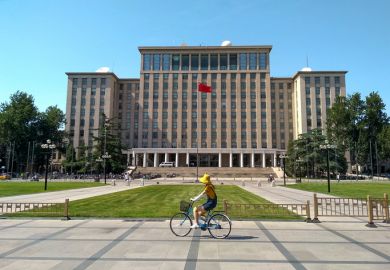Canada’s collapse in international student recruitment has been described as a warning to other countries – including the UK and Australia – of how quickly a sector’s reputation can be “squandered”.
Justin Trudeau’s government announced in January that it would cut the number of study visas from 436,600 last year to 292,000 this year, a drop of about a third. However, the effect of this announcement combined with other policy changes – such as higher wealth requirements and new working regulations – means that universities are now expected to fall well short of that cap, with projections by admission firm ApplyBoard indicating that just 231,000 permits will be approved by the end of the year, a fall of 47 per cent.
Last week Ottawa announced that the cap would be reduced by another 10 per cent for 2025 and 2026, and will include master’s and doctoral students for the first time.
“That will mean big financial challenges in the near term, and in the longer term the bigger worry is the damage it’s doing to Canada’s ability to compete for the talent that we need to grow our economy,” Gabriel Miller, president of Universities Canada, told Times Higher Education.
“Underinvestment has got universities already on the brink financially and then they’re being hit by this drop in international enrolment like an earthquake, so you’re seeing big deficits growing in universities across the country.”
Mr Miller said that Canadian universities would need bigger class sizes, to do less research, and would face pressure to increase costs on students, while some institutions in Ontario were likely to be “asking how they’ll keep the lights on”.
But beyond the local impact, Canada’s experience is being seen as a lesson for other leading anglophone sectors battling increased hostility to immigration.
Most notably, Australia’s government has announced plans to cap international student enrolments in publicly funded universities at 145,000, roughly the same as 2019 levels, from next year. Although legislation behind the limits is yet to be approved, growing visa delays and refusals have also been hampering institutions’ recruitment efforts.
And in the UK, the number of prospective students applying for visas is down 17 per cent year-on-year, with the sector still reeling from the introduction of a ban on students bringing dependants with them unless they are on postgraduate research courses, introduced by the former Conservative government in January.
Although the new Labour administration has adopted a much more welcoming tone towards overseas learners, it is yet to back this up with any policy changes for a financially troubled sector that finds itself increasingly reliant on foreign income.
“What’s happened in Canada should be a warning to everyone in the world because Canada is perilously close to squandering a reputation it built over years and years as being a great destination for very talented young minds,” said Mr Miller.
“They say a reputation takes a lifetime to build and a day to destroy, and governments need to be very mindful of that.”
Analysis by Times Higher Education shows that Canada’s policy reforms appear to have had a greater impact in some recruiting markets than others. The number of permit applications processed from India has fallen by 56 per cent, while there have been declines of 33 per cent for Nigeria, 42 per cent for the Philippines, and 20 per cent for China – four nations that collectively contributed six out of every 10 international students in Canada last year, according to Immigration, Refugees and Citizenship Canada figures.
Mr Miller said that ministers’ next steps would determine whether the country’s universities faced “one bad year and the beginning of a recovery, or the start of three, five or even 10 bad years”.
Daniel Jutras, rector of the University of Montreal, said government announcements were sending the message that “Canada is not a welcoming nation”, but were part of growing hostility towards immigration in major Western nations.
“A shortage of housing, big pressure on public services, healthcare and so on, is prevalent in a number of Western countries,” he said.
“And so, the entire sector, in the Western world in particular, is going to be affected by this, and it may indeed slow down mobility of students either on a permanent or temporary basis.”
Duncan Ivison, the new University of Manchester vice-chancellor who was previously deputy vice-chancellor of the University of Sydney, said it was notable that left-of-centre governments were responsible for the reforms in Canada and Australia.
“It’s part of the impact of migration on global politics,” added the Canadian. “I think governments everywhere are struggling with this issue, whether on the left or the right.”
POSTSCRIPT:
Print headline: Canadian recruitment collapse is a ‘warning’
Register to continue
Why register?
- Registration is free and only takes a moment
- Once registered, you can read 3 articles a month
- Sign up for our newsletter
Subscribe
Or subscribe for unlimited access to:
- Unlimited access to news, views, insights & reviews
- Digital editions
- Digital access to THE’s university and college rankings analysis
Already registered or a current subscriber?

















